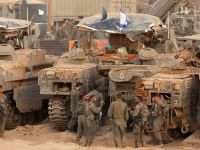China on Wednesday branded US plans to push ahead with a missile defence system a threat to world peace, while Washington's European allies and a wary Russia hoped they would be consulted about the programme.
Beijing issued no immediate official reaction to Tuesday's defense policy speech by US President George W. Bush, but the state news agency Xinhua quoted statements strongly criticizing the plan.
"Analysts said the US plan to build a missile defense system will not only spark a new arms race and create a proliferation of weapons of mass destruction, but will also threaten world peace and security in the 21st century," Xinhua reported.
The views of analysts quoted in Xinhua often reflect those of the government.
There were mixed reactions in Moscow, where a prominent Russian lawmaker slammed the proposals as a threat to global security, but other officials saw hopes for renewed Russia-US cooperation on strategic stability in general.
NATO was non-committal on the question, but said Bush was right to focus on the threat of ballistic missile attacks by so-called "rogue states" like Iraq and North Korea.
Alliance member Germany still had reservations about the plan, but welcomed the US president's promise to consult with Russia, China and Western allies.
France appeared to slightly soften its opposition, with President Jacques Chirac's spokeswoman saying the issue "would provoke consultations and developments, between the US and its allies, and among Europeans."
On Tuesday, Bush vowed to press ahead with the deployment of the shield, arguing that the United States had to move beyond the framework of the 1972 Anti Ballistic Missile (ABM) Treaty with Russia.
The treaty banned missile defence systems because of fears that one of the Cold War superpowers could be tempted into a first strike nuclear attack.
In Asia, Japan said it "understands" the need for the US plan, while South Korea, where thousands of US troops are stationed, was uneasy about it.
A Japanese official said Tokyo shares the US belief that in the post-Cold War era, "irresponsible nations" were on the verge of acquiring ballistic missiles, which would be a serious threat to security."
South Korean President Kim Dae-Jung had a 15-minute-conversation with Bush in which he urged him to consult closely with allies over the deployment of the shield, South Korean officials said.
"I appreciate the fact that the US government is holding deep talks with its allies and other countries with their interests at stake in pushing through with a new missile defense shield," Kim was quoted as saying.
Russia's long-standing opposition to the missile defence scheme was reiterated by prominent lawmaker Dmitry Rogozin.
"If the United States actually go through with their intention to abandon the 1972 treaty, that would destroy the entire security system we have today," Rogozin, head of the parliamentary foreign affairs committee, was quoted as saying by Interfax news agency.
He warned that Russia may even go through with its threat to renounce the START-2 weapons reduction treaty if the US violated the ABM accord.
On a different note, however, Interfax quoted sources close to the Russian administration as saying that the Bush proposals could pave the way for "a renewal of Russian-US consultations on strategic stability in general and on START and the anti-missile defence system in particular."
The statement noted a passage in Bush's speech in which he referred to a further cut in strategic weapons stockpiles. "The Russian side can only hail such intentions," the statement said.
In Brussels, NATO Secretary General George Robertson said he had "listened with great interest to ... Bush's speech on the growing challenges to global security, including the requirement for missile defenses."
"The president was right to focus on these new security challenges, and I welcome his commitment to close consultation with the allies," he said, adding that he was pleased Bush was sending a team to brief NATO next week.
German Foreign Minister Joschka Fischer said Bush's speech had "explicitly stressed that he aimed to seek a new basis for strategic stability and security in consultations with Russia and held out the prospect of a quick and far-reaching reduction of strategic offensive weapons."
"He also announced his intention to include China in the considerations," Fischer, who is visiting the US, said in a statement, noting that Bush had also offered to cooperate in preventing arms proliferation.
The British government welcomed US pledges to consult its allies about the shield, but stopped short of endorsing it.
A Downing Street spokesman praised "the very open approach" the Bush team had taken "in setting out its assessment of the missile threat, particularly from rogue states, and setting out its ideas on a new approach to the offensive and defensive response to that threat.
"We share the US concerns, and we welcome President Bush's determination to consult allies on the future of missile defense."
Washington needs British help to establish the shield, as it would involve using an early warning radar station at Fylingdales in northern England, and a communication center at nearby Menwith Hill.
The Netherlands, for its part, said it was not surprised by the decision but congratulated the US for deciding to consult its allies and above all Russia – PARIS (AFP)
© 2001 Al Bawaba (www.albawaba.com)







